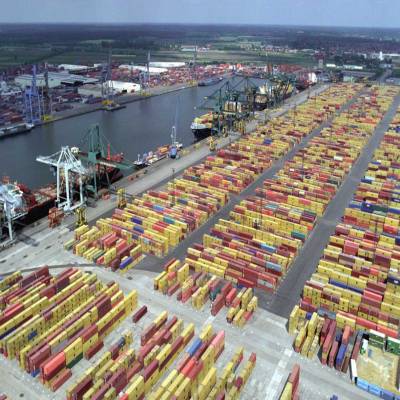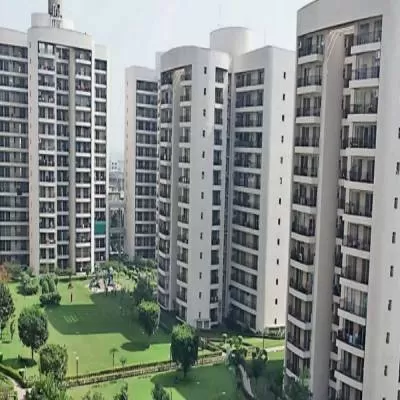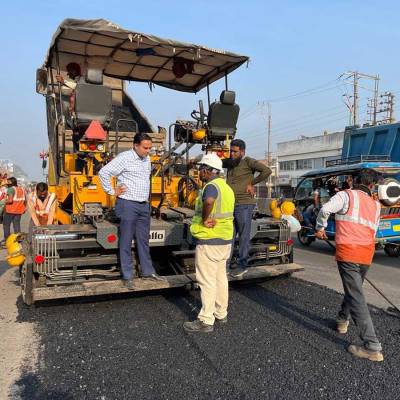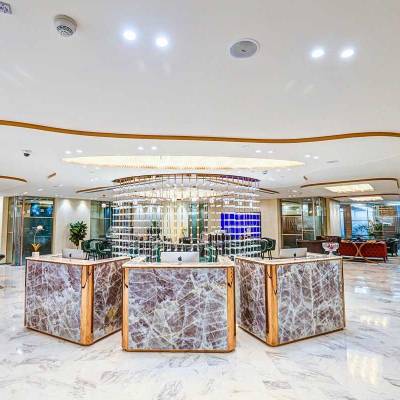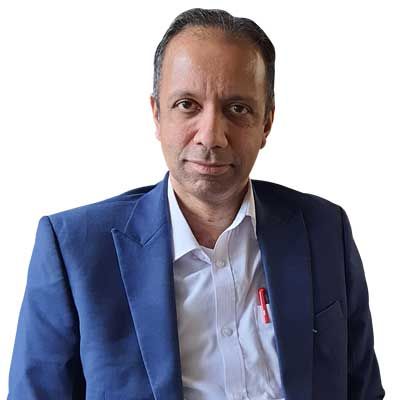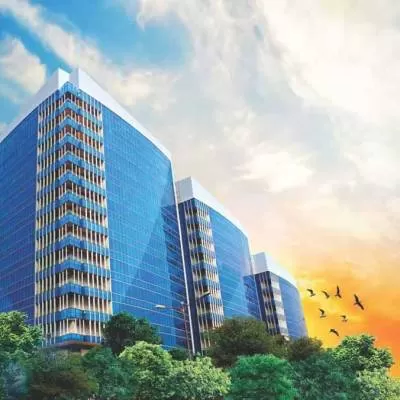- Home
- Real Estate
- Meet the Specialists!

Meet the Specialists!
One year and the change in mindset and expectations is evident! Like last year, CW once again brought together select building specialists at its head office in Mumbai last month. While last year, the industry felt ´the good days are yet to arrive´ and that ´something is missing´, this year optimism has been at the core of all discussions. Of course, while segments such as façade, painting, restoration and some others still see the markets as largely unorganised; the experts - based on market dynamics - have shared an estimated timeframe by when the sector is expected to grow. That, too, considering that India has nearly no records or researched data on the various specialised services used in buildings and the companies offering these...
A lot has changed over the last decade. Especially in the residential segment, where not much was spoken about specialised services, whether HVAC, waterproofing, electrical or plumbing. However, the current market looks promising and the growth rate for all these services is on the rise. ´It´s an era of outsourcing,´ says Raman Sapru, President-EPC, Omkar Realtors & Developers. He gives the example of developers who used to build 1 million sq ft of construction and are now constructing 10-30 million sq ft. Today, there is a huge gap in the bandwidth they need, which can only be filled with the right support industries. ´For instance, if I am developing a 300 m building, I need at least 10-15 speciality trades for construction,´ adds Sapru. ´The support industry is required to create volumes.´
Market scenario
The global revenue for construction works, including speciality contracting, exceeds $7 trillion per year and is expected to reach $12 billion by 2020, according to reports. Amid this, emerging markets such as India are going up as increased population and a growing middle class are influencing demand for infrastructure and housing. ´Pan-India, speciality contractors constitute two-third of the project cost,´ says Ani Ray, Managing Director, ACC India. ´With more high-rise buildings and high-specification buildings being in demand, their importance is increasing.´ And Manit Rastogi, Founder Partner, Morphogenesis, says, ´The scope for speciality contractors in an emerging nation such as ours is enormous given the fact that the matrix of 13 specialisations (structure, MEP, vertical transportation, lighting, etc) that make up this industry expands to nearly 60-70 types of specialisations in architecture at large. How you manoeuvre and weave through these subsystems is what your whole project system looks like.´ In the architectural world, it is in the optimisation of this project system that specialist contractors can add the greatest value. Today, specialised contractors are available for site preparation, concrete, electrical, HVAC, plumbing and painting, among others. For Neeraj Bansal, Partner and Head, Real Estate and Construction, KPMG in India, ´HVAC; mechanical, electrical, plumbing (MEP); pre-fabricated technology and façade services; speciality architects and engineers are among the popular ones in the present day.´ However, he goes on to emphasise that this category is still in the nascent stage and is largely an unorganised market.
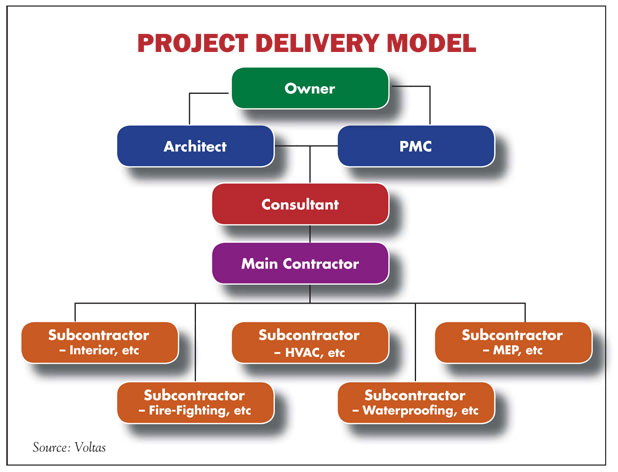
However, the industry agrees that the market is maturing. Piyush Gandhi, National Director-Project & Development Services, JLL India, says, ´Invariably most of the projects in metro cities today rope in speciality contractors, the popular reference categories being façade, waterproofing, speciality chemical applications, acoustics, insulation and lighting contractors.´ Over time, this support industry has started evolving as systems are somewhat demanding. Ashish Rakheja, Managing Partner, Aeon Integrated Building Design Consultant LLP, shares an example: ´Today, in air-conditioning, we are moving towards energy-efficiency. Energy-efficiency is not just driven by the product but the way you install, test and commission it.´ And Chetan R Raikar, Chairman & Managing Director, Structwel Designers and Consultants, says, ´They are mostly inducted as sub or associate contractors to the main contractor. They are important for the success of any project as no single, medium-size contractor will have all the disciplines of construction activities in house.´ To this, Rakheja adds, ´A building may have 10-25 speciality contractors and the owners, being non-technical people, may face a lot of trouble coordinating between them. So, they hire a general contractor who manages the speciality contractors.´ This appears to be the trend.
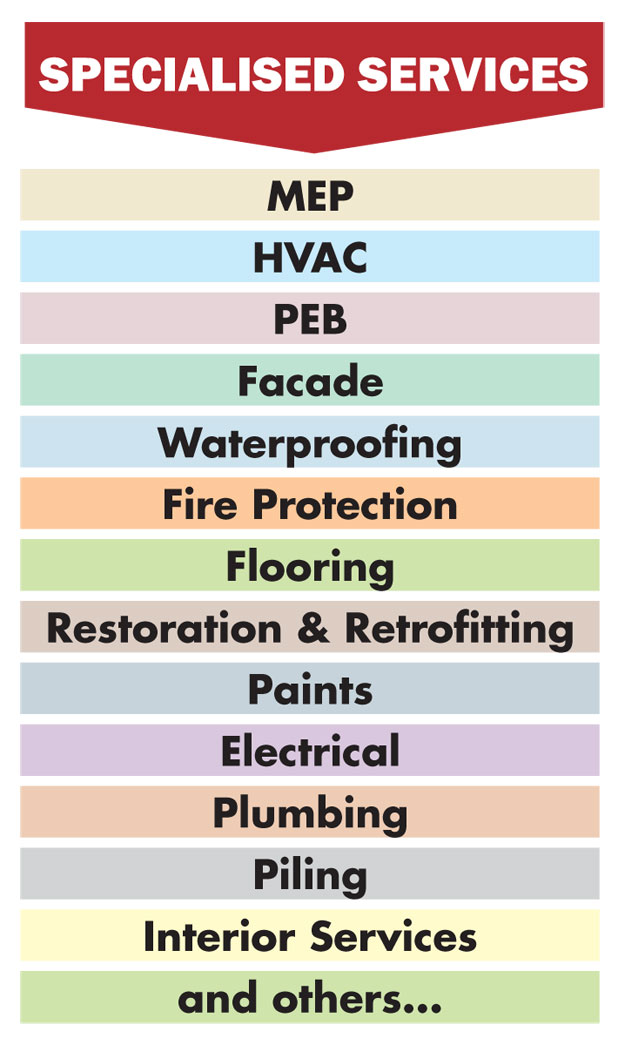
Specialised advantage
Here´s why companies with specialised services are becoming a necessity for projects. As Gandhi says,´The functional and aesthetic output of any real-estate development, whether it is residential, retail, office buildings or an interior fit-out, becomes more efficient with the use of speciality products and contractors.´ Also, these companies help qualitatively and quantitatively as they contribute towards high performance and better quality of buildings. ´They are roped in because of the quick turnaround they bring in with specialised knowledge, experience and products,´ underlines Bansal.
What´s more, a speciality contractor can perform tasks more efficiently and ensure desired level of perfection with more competitive pricing, says Raikar. Ray adds, ´The advantage is such that he can point to the pitfalls in advance rather than getting stuck in the middle of the project.´ So, builders or developers can basically improve their learning curve by putting specialised people on to the job.
On that note, Ravindra Jain, Executive Director-Contracts, Prestige Estate Projects, shares, ´A specialised contactor and his engineers in supervision are skilled to handle this kind of work, resulting in quality. Also, they pre-plan to do work in a particular way, which adds to the speed of construction.´ Sunil Jha, Managing Director, Shristi Infrastructure Development Corporation, lists the benefits of roping in specialised contractors as ´Proven track record; reliability in the specific field; quality workmanship and supervisors; service on time; after-sales, service and warranty; and safety.´
Another aspect is cost-effectiveness.
As Jain shares,´When we share our designs and drawings for pricing, the contractor suggests changes to bring down cost or bring in more efficiency.´ So, while adopting these specialised services may appear to be expensive initially, in the long run, it is much more cost-effective.
Stepping into the job
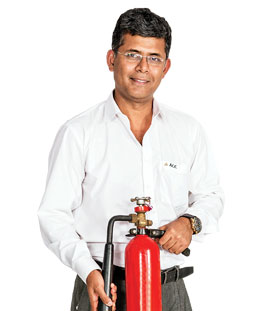
Ani Ray,Managing Director ACC INDIA
In India, speciality contractors are, in most cases, involved when designs are more or less frozen. Building contractor Ray says, ´I have not seen a project in India where the specialised contractor has been engaged within one year of the structural commencement.´ That said, Mahesh M Mudda, Managing Director & CEO, New Consolidated Construction Company, and Ray both agree that if involved initially, a lot of trials (and errors) could be executed much cheaper and faster, without reworking.
As a builder, Jain does not see any benefit in involving the support industry at the design stage, saying, ´We opt for consultant services as they are supposed to have all the specialised knowledge and skills.´ Rastogi, too, sees the specialist consultant as an important stage between the architect and the contractor.´Integrated project delivery, or getting the consultant in at the earliest stages of designing is yet to become the norm,´ he says. ´They could be roped in at the right time, in an integrated manner.´ Developer Sapru considers it unfortunate that builders in India engage with contractors at a much later date. For Omkar, he says, ´We rope in many contractors at the early construction stage itself and have almost no rework at the later stage in the project.´ Raikar adds, ´We do involve them in designing a system like PEB or fibre wrap, as it is necessary for finer design and to avoid errors in specifications.´
Roping speciality contractors at the planning stage could also help in proper coordination among various teams such as design, project, finance and procurement, providing a holistic approach to the project and saving time and cost overruns for the developer.
After construction
After construction, the speciality contractor has a key role to play in maintenance as well.
Rakheja highlights the advantage: ´While the company that installs these speciality systems is responsible for operating and maintaining them, the owner is able to train the staff while the operation and maintenance (O&M) is done by the contractor.´ Bansal agrees, saying, ´Building management systems (BMS) are operated by personnel who require training from these specialised contractors while executing the services in the building. Also, proper documentation in the form of user manuals needs to be designed and developed by speciality contractors to fuel high-performance levels.´
Gandhi shares,´Also, generally there is a warranty or maintenance contract committed by these companies for their products or solutions.´ Sapru adds, ´These specialists, as per our company´s contract, have to do the required maintenance for the next seven years after completion of the project.´ For his part, Jain affirms, ´Other than maintenance, they also play a role in defect liability, wherein if anything goes wrong, the contractor repairs it free of cost.´
Challenge zone
A major challenge is lack of educated, skilled and trained manpower. Rakheja elaborates on the consequences: ´The best of the equipment brought in does not function properly because it is not installed correctly.´ He backs this with an example: If the windows are not installed properly, there could be leaky facades. Also, there is no agency in India certifying or training installers to be specialists in their respective fields. As Bansal says, ´Lack of regulated associations for these contractors becomes a hindrance in dealing with the unorganised segment.´
Meanwhile, Jain points out, ´There are challenges specific to coordination between the main contractor, a speciality contractor and multiple speciality contractors.´
Raikar adds, ´Enforcing the guarantee in case of a failure of performance of installations by a speciality contractor is a challenge for project managers or clients.´ And, Ray highlights, ´The sort of experience required for constructing a 100-plus tall building is not available in India.´
For Sapru, although the market has opened up, established industries are still missing. ´In other countries, a finishing contractor will have a huge factory of mill work; they make a lot of wooden things and have backend factories that work for them,´
he says. And Jha adds, ´Local contractors working in this field have flooded the market with unreliable quality of product and poor after-sales services.´ There is an information gap that needs to be bridged for more involvement of speciality contractors in the projects. ´However, sometimes, products and technologies are still imported,´
says Gandhi. ´This increases the implementation time gap and gaps in technical knowhow of local partners.´ And, Rastogi adds, ´There is a wide gap from the drawing board to execution.´ The drawing board assumes a certain level of perfection when it comes to execution, while our execution strategies are not quite perfect as yet. He gives the example of BIM: ´Everyone is making their own BIM components while it should be the other way around. Contracting should be telling us about the components available by manufacturing, and we should be using the BIM software to assemble those components.´ Unfortunately, in all the design tools used, the technology of how the entire piece comes together is not yet fully embedded.
Looking forward
The construction sector is among the highest contributor to the Indian GDP and its share is expected to grow going forward, as the Central Government has been making efforts to revive the Indian economy through increased public investments into various sectors. ´Hence, the scale of operations is set to grow in the future,´ affirms Bansal. This would certainly help in some of the Central Governments´major goals, such as the development of 100 smart cities and ´Housing for All by 2022´. These evidently provide huge opportunities for the speciality contractor segment. Rakheja adds, ´There will always be a role for speciality contractors, but eventually one agency will be expected to deal with more specialities.´
Gandhi believes that although it is at an early stage, the industry is all set to move at a fast track growth. He shares the high focus on occupant´s health and comfort, technology, energy efficiency and the rising numbers of high rise or technical developments like data centres as an example that clearly illustrates the need for specialised solutions and contractors. And, ending on a positive note, Mudda says: ´This segment will grow at a much larger scale. There is definitely huge scope for speciality contractors.´
Quick Bytes
- The market for speciality contractors is maturing.
- In demand: HVAC, MEP, PEB and façade services.
- Benefits: High performance and better quality buildings, quick turnaround, cost-effectiveness, etc.
- Post construction, the contractor has a key role to play in O&M.
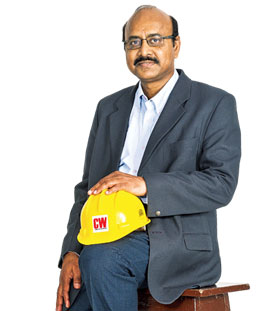
MEP & HVAC
Mechanical, Electrical, Plumbing (MEP) is a popular scope of work required in residential and commercial buildings like offices, educational institutions, hotels, hospitals, etc. It is an aggregation of specialist services for a project and depends on the implementation methodology as decided by the owner. According to M Gopi Krishna, Executive Vice-President & COO, Voltas, ´In large projects, Voltas proposes a combined MEP services to the customer for effective coordination and timely completion.´ He adds that for small value projects, the customer chooses a separate specialist agency for HVAC, fire fighting, electrical, plumbing services, etc.
Companies such as Voltas, being HVAC specialist contractors, offer life-cycle solutions to the customer wherein key HVAC products, manufactured in-house or through partners, are used in the design and engineered HVAC solution and subsequently provide after sales services like O&M of the solution.
As Krishna avers, ´When Voltas started, there were very few companies that used to invest in manufacturing the air-conditioning equipment, install it and offer after-sales service post installation.´ Today, Voltas offers electrical, plumbing, fire-fighting, water and wastewater treatment solutions, besides the core HVAC services to various customer segments like industrial, government and infrastructure.
When does the speciality contractor step in? At a stage after the completion of the facility´s civil RCC structure. However, the induction of the specialist contractor for planning the facilities will be from the initial stage of the project along with architects who design the facility.
Services offered? MEP services contractor provides integrated offerings for residential and commercial buildings. By integrating the services, the customer would benefit to complete the project in time and at a better quality, since the coordination among various services is a major issue. The customer has to take ownership of coordinating and supervising various specialist contractors´ work in case of individual scopes given to many. This would result in time overrun leading to cost overrun due to rework and quality, besides claims at the end of the project leading to dissatisfaction. In smaller projects like residential and SOHO, most of the customers would split the contract and supervise the work. However, in bigger commercial and industrial projects, it would be better to choose a specialist contractor who can offer MEP services. Specialist contractors also offer solution performance guarantees over specific period through separate O&M contracts. Energy consumed in services is predominantly through HVAC and lighting in any facility and these MEP services specialist companies offer guaranteed savings through specially designed O&M contracts. Voltas also undertakes design and build services in MEP utilities under green building, net zero energy buildings, zero liquid discharge facilities, etc, with sustainable designs and solutions.
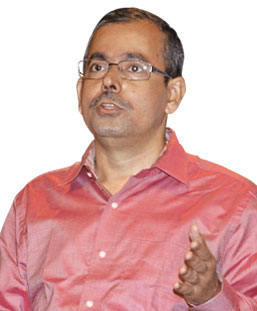
Electrical Contracting
In developed countries, where contractors have well-trained and licensed electricians working with them, electrical contracting is a specialised service. ´But in India, we have failed to give this service the required respect,´ says Santosh Parulekar, Co-founder & CEO, Pipal Tree Ventures.
He adds that in India, construction companies find local electrician-cum-contractors to do the work while the material is supplied directly by the company. While some organisations, mainly in metropolitan cities, are keen to give the complete electrical work to specialised contractors, some large companies in other cities have now started showing interest as well. Pipal Tree Ventures offers end-to-end services in electrical services, from pipe laying, material procurement and complete electrical work to installation and testing. Parulekar shares, ´We handle complete financial management for the project.
With well-trained staff, we have all legal compliances including ROC registration, service tax, VAT, PF or ESIC, etc, which can keep the main developer or contractor away from legal issues´ He shares more on the highlights of this speciality service:
When does the speciality contractor step in? Normally, pipes are laid before plastering. However, real electrical work starts after plastering is completed.
Services offered? Complete end-to-end service, staring from material procurement, electrical wiring, fittings and installation to testing.
Have services been utilised to complete potential? Not at all.
Challenges involved? In many instances, the site management feels they can save money and have better control in their current way. Also, owing to abundant availability of local electricians (unlike painters and plumbers), they are finding it easy to get this work executed.
Time it could take for this speciality segment to grow? Around seven to 10 years.
Have services been utilised to complete potential? Normally those customers who regard time as a important factor in the delivery of the project would choose a combined MEP specialist contractor to save on coordination and integration time among services. This important factor is not well recognised in the current situation in India but is becoming popular with customers who demand quality and cost controls.
Challenges involved? The construction industry is going through a tough phase currently where a large number of builders and developers are unable to complete the projects in time due to various reasons. Along with them, the main contractors who undertake their contracts have come under financial stress due to delayed cash flow. This has a cascade impact on all those involved under them in the value chain providing service. We have been impacted by delays in project execution by customers and main contractors since the last five years due to issues on clearances from government agencies, disbursement of finances, etc, resulting in cost escalations, which are not reimbursed. Some construction companies have even defaulted in paying to contractors like us for various reasons. Time to complete, cost to complete, client´s cash flow are the key factors to decide to choose an opportunity. Besides, the commodity price and foreign exchange rate fluctuations are challenges that need to be addressed.
Time it could take for this speciality segment to grow?
The projected growth of GDP and the investment thrust in the infrastructure by the government in the coming years will give rise to opportunities in the healthcare, education and infrastructure sectors. HVAC and MEP services are required in all these sectors of investment and the company is cautiously optimistic on the opportunities considering that many construction companies are under financial stress. Plumbing Contracting Services
The working scenario for a single plumbing contractor in India is different from the global picture. World over, the contractor is responsible for water pipes and gas pipeline as well as fire fighting. He is responsible from start to end, including material procurement, scaffolding till installation verification and certification. Speaking of the Indian scenario, Santosh Parulekar, Co-founder & CEO, Pipal Tree Ventures, says, ´Most contractors have been procuring material from manufactures and awarding it to labour contractors.´ However, in recent times, there has been a realisation that the indirect cost overheads in this approach are high. Now, some companies are awarding the complete plumbing and fire-fighting works together to specialised contractors. Pipal Tree Ventures normally works as a single specialised contractor for all works related to electrical, waterproofing, painting, plumbing, grills, etc. However in plumbing, the company offers complete end-to-end services from scaffolding, material procurement, complete plumbing and fire-fighting to commissioning and approval by authorities.
Parulekar says, ´We have a special partnership with IIPA for training our staff in plumbing.´ He shares some more facts and estimates on the sector:
When does the speciality contractor step in?
After completion of the building´s slab and masonry works.
Services offered? Material procurement, scaffolding, project execution for plumbing as well as fire-fighting.
Have services been utilised to complete potential? No. While some large builders have slowly started adopting this method and getting huge benefits from it, other organisations are still slow to take on these services owing to site management opposition and comfort with the old way.
Time it could take for this speciality segment to grow? Around three to four years.

Fire Protection
Fire protection is becoming an important part of utility. The latest clause states that any public space - schools, auditoriums, hotels - needs to have fire protection to secure the height of the building. And, India is marching up to worldwide standards in this space. Rajgopal N Murthy, Managing Director, Santech Engineers, says, ´Fire protection has always been in demand in India, but more for industries than buildings. But now, going by the law, any structure with more than 40 m needs to have fire protection in place.´ No doubt, this is becoming an important part of MEP services as well. In fire protection, Santech Engineers, with operations in Karnataka, Hyderabad and Chennai, hands over buildings worth at least 2 million sq ft every year.
The company is involved in plumbing works as well.
Murthy shares some more details on the fire protection service: When does the speciality contractor step in? When the building basement work is completed, the builder floats the tender. When awarded the job, we sit with the consultant and discuss the designs and make improvisations. This is then followed by execution of work.
Have services been utilised to complete potential? Bengaluru´s approach is highly professional towards opting for fire-protection services. In cities where we operate, there is no dilution in quality and specs.
Challenges involved? There are clearly laid and standardised norms, and so not much of a challenge.
Time it could take for this speciality segment to grow? It should take another five years for the segment to be much more organised and professional.
Facades
India is a large market for facade glazing and fenestration. However, there are too many players, of which very few companies are organised. And, within this organised structure, there are no more than three or four specialised facade glazing contractors. One of them is Aluplex India, which Navin Keswani, Managing Director, describes as ´among the leaders in terms of system technologies, infrastructure and value engineering that it brings to the drawing board at the time of conceptualisation of the building.´ Today´s builders or developers are looking at specialised contracting services. As Keswani tells us, instead of standard curtain walls, thermally broken profile curtain walls can keep the heat out while retaining the air-conditioning temperature inside with a thermal break aluminium profile. And, instead of ordinary glass, we have graduated to insulated double glass. Further value-addition could be insulated double glass with low-E. Aluplex is a specialised contractor for facades and fenestration. ´As a specialised facade contractor, the company offers special kind of glazing, doors, curved glass, fire-proof material in profiles, etc,´ says Keswani as he shares more on this specialised segment:
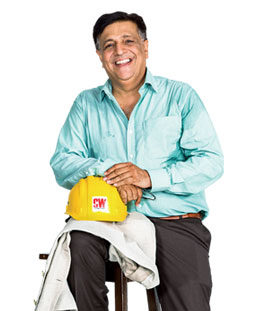
When does the speciality contractor step in? A simple question to be answered with complexity. We would like to be involved in the project from the design mode. While a few architects and facade consultants understand this, the majority gets us involved after breaking ground and, then, we cannot bring value engineering proposals to the table.
Services offered? A basic service offered, which is a cost-free exercise, is helping builders, developers, architects and facade consultants with the conceptualised facade concept prior to the tender stage. Further, we offer specialised services such as value engineering of the facade and ensuring correct material selection in terms of specifications and cost. We also try and minimise wastage as much as possible. Rather, we optimise the material content or input received in terms of cost benefit ratio to the owner.
On site, we bring special equipment and glass robots to hold glass for installation, technology to lift panels up, specialised drilling machines for correct fixing of the bolts, and more.
Have services been utilised to complete potential? Services are recognised and appreciated. The builder or developer is aware that to offer the best, he needs a speciality contractor who can give value for money.
Challenges involved? While you would like to give more, there are always budget constraints. The challenge is building with the right product at the right price, and creating a win-win situation.
Time it could take for this speciality segment to grow? This segment is growing year-on-year. But there is still a large vacuum. It´s a big market; given that the next 15-20 years is considered boom time for real estate, the specialised segment is set to grow.
Restoration And Retrofitting

With limited funds for conservation, several times, products available in the market are not very realistic in terms of budget. Conservation architect and historic building consultant Abha Narain Lambah, Principal Architect, Abha Narain Lambah Associates, says, ´Despite European products being available, we tend to use less patented products and more craftsmanship in India.´ She emphasises upon the need to have contractors who know how to deal with historic buildings. As historic buildings require special considerations, Lambah says ´you need contractors who specialise in stone craftsmanship and carving, which is not required in normal construction.´ Also, traditional techniques such as lime plastering would not be available in a general contracting firm. She shares more on this segment:
When does the speciality contractor step in? The contractor comes in as soon as the tender for the project is floated.
Services offered? Some contractors specialise in only one type. But there are quite a few who offer integrated services such as roof repairs, wooden carving, lime plasters, stone carving, etc.
Have services been utilised to complete potential? No, because this is a growing field.
Challenges involved? It is a new and niche segment. One challenge is that because the specialised contractor does not have the tax or turnover certificate, he has to work under the civil contractor. So there needs to be a greater awareness and they need to be given higher labour charges and better working conditions.
Time it could take for this speciality segment to grow? Another five to 10 years.
Painting
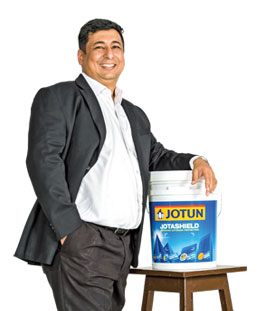
In India, for years, companies were used to buying paints directly from the paint manufacturing companies and using a large number of contractors to provide labour. Santosh Parulekar, Co-founder & CEO, Pipal Tree Ventures, reasons, ´This was owing to the conviction of site management about savings on project cost owing to better control on direct cost.´ Today, while there may be thousands of painting contractors in cities across the country, the good ones who can handle sites, developers and clients and get a quality job done are very few. Percy Jijina, Director-Decorative Paints, Jotun Paints, says, ´The quality need not be just in the drum, it needs to be on the wall.´ For painting, Pipal Tree Ventures offers complete end-to-end services including waterproofing, scaffolding, material procurement, complete painting work and specialised painting.
And, in this specialised segment, Jotun Paints takes up the contracting job and ropes in external contractors, who are recommended by Jotun or guaranteed contractors. Jijina adds, ´Different types of contractors are recommended depending on the job, whether it is internal or external works.´ The experts share more on this growing contracting segment:
When does the speciality contractor step in? ´After completion of plastering,´ says Parulekar.
Services offered? ´A paint contractor could also take up carpentry, plaster, plumbing or masonry work,´ says Jijina.
Have services been utilised to complete potential? ´Most builders or developers are slowly adopting this method, but it is taking time to convince them owing to the overwhelming influence of site management, which is opposing the change,´ avers Parulekar. However, Jijina says, ´Builders want quality and peace of mind. They need a white-collar contracting company who can understand the requirement and put all the billing together in the right way.´
Challenges involved? ´To have good talent,´ says Jijina, adding, ´In European countries, a painter is a professional and goes to a proper institute to get trained as a painter. India still has a long way to go in this direction.´
Time it could take for this speciality segment to grow? While Jijina agrees it is becoming popular, Parulekar estimates, ´Four to five years for this contracting to become organised in India.´
Interior
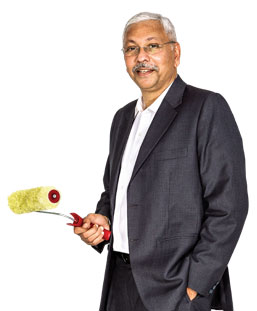
Interior contracting services in India are highly unorganised compared to other parts of the world where the market is much more mature with organised players providing quality services. ´There are hardly any players in India who provide an end-to-end solution to complete interior needs,´ says Anil Mathur, COO, Godrej Interio. He adds that there are specialised contractors who deal in space designing, lighting, HVAC, electrical, plumbing, security, etc, but few aggregators to provide a single-window solution to the customer. And, there is another set of companies who focus on maintenance of offices. Hence, designing, interior implementation and maintenance are a highly diverse and disparate set of operations and possibly the most disorganised part of the India market today. Umesh Rao, CEO, Vector Projects (I), shares, ´In terms of office spaces, there is a realisation to offer good interiors but we still have a long way to go with public institutions and government sectors just getting a feel of it.´ He adds that with demand for signature homes, residential interiors have become a big industry. What has not caught up but will do so slowly is schools, as there is increasing awareness and demand for proper amenities in toilets, classrooms, etc.
Further, today, as Mathur highlights, ´Buyers are looking at speciality contracting as a serious business and handing over assignments to specialised service providers.´ Godrej Interio offers end-to-end solutions from designing of spaces and implementation of interiors to maintenance of the spaces under use. This includes space designs with high focus on aesthetics and ergonomics, lighting solutions, complete civil and interiors work, MEP, HVAC, security and surveillance, furniture solutions, green building consultancy and facility management services,´ he adds. Vector Projects, too, offers end-to-end solutions such as fire-fighting, HVAC, interiors, BMS, security management and data censors. Rao adds, ´We offer complete solutions in interior fit-out work as well.´ Here´s more from the leaders on this specialised segment:
When does the speciality contractor step in? ´Once the engineering drawings and material selection is finalised,´ says Mathur. ´In a 10-storey building, as soon as the fifth floor slab is put, we are called in,´ says Rao.
Services offered? ´A complete 360o approach to interiors can be offered, hence dealing with a single-window solution provider soon after constructing the bare shell of the building - design, build and maintain,´ says Mathur.
Have services been utilised to complete potential? Yes, says Rao. Mathur adds, ´The segment is growing and we see huge potential for brands like ours to provide end-to-end solutions that are high on quality and predictable on timelines unlike any local contractor.´
Challenges involved? ´During the building process, while the client is focused on look and function, the builder focuses on structure,´ says Mathur. ´The challenge is to bridge the gap between the two parties.´
Time it could take for this speciality segment to grow? ´In the past five years, we have seen a shift in the market from local players to branded solution providers,´ says Mathur. He adds that it will take some time for the segment to become organised but trusted and quality solution providers are definitely gaining importance. Rao adds, ´With statutory norms becoming more stringent, it will take another five to 10 years for all organised players to take up complete interior fit-out work, much of which is being done by the unorganised segment today.´
PEB
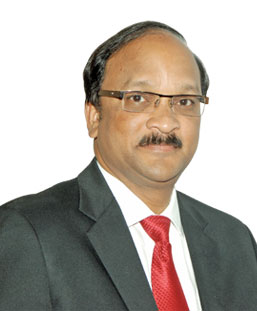
India is the third largest PEB market in the world after US and China. Still, the country´s per-capita steel consumption is significantly lower than the global average. The PEB penetration in construction segment is also low. This is primarily because PEB is mostly used in the industrial and warehouse segment and less in the commercial or offices segment. ´Going forward,´ D Raju, Managing Director & CEO, Kirby Building Systems India, says, ´I see a much higher share of PEB in India and it will play a major role in the development of the construction, infrastructure and industrial segments.´ Rise in demand for PEB is majorly because of reduction in overall project cost, faster return on investment and lower turnaround time. Raju adds, ´PEB construction as such is slightly costlier as initial investment or equal to RCC construction with minimal maintenance costs.´ At the same time, foundation costs are lower than a conventional structure. And, while fabrication is being carried out at the plant, foundation and other civil works can go on in parallel at the job site, saving time. According to an INSDAG report, PEB can save up to 15 per cent of energy costs by proper designing and direct usage of natural lighting through usage of various accessories in the building. Kirby is a total solution provider and offers design, manufacture, supply and construction of PEB. Raju confirms, ´Today, at 200,000 mt capacity per annum, Kirby is the market leader in the India with over 16,000 buildings spread over 25 million sq m.´ What´s more, the company is a partner in setting up the world´s largest PEB building - a 350,000 sq m manufacturing factory consuming 23,000 mt of steel - for Renault Nissan Automotive near Chennai. He shares more on the PEB experience:
When does the speciality contractor step in? The PEB contractor is normally finalised for any project in the beginning, once the architectural layout is finalised, as the project can move forward only after the building is constructed.
Have services been utilised to complete potential? Yes. Kirby ensures all services are offered to customers to the fullest with project sizes varying from 10,000 sq ft to 10 lakh sq ft. However, PEB´s need to be utilised more for the commercial or office building segment.
Challenges involved? There are many challenges for any type of project; complete project execution is a multifaceted process and successful completion depends on proper planning and execution.
Time it could take for this speciality segment to grow? The PEB industry is yet to get true recognition and industry status to become a more of an organised segment like other sectors. All PEB players have formed an association and are working to maximise the usage and benefits of PEB across the construction Industry.
Waterproofing
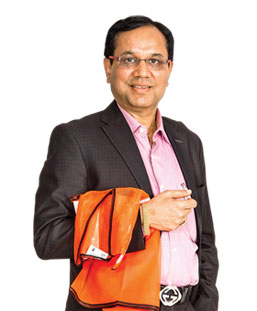
The Indian market for specialised waterproofing, by some estimates, is growing by over 20 per cent CAGR over a decade or so. Still, compared to America, Europe, China and some Asian countries, this is below the potential of the Indian market. Prasad Satavse, CEO, Chowgule Construction Chemicals, reasons, ´The market is driven by developers or contractors and not by any standards or binding legal requirements as seen in most of the developed world.´ The extent of usage of waterproofing services is mostly driven by the willingness of the constructor, which in turn depends on the cost-benefit ratio (mostly short term) and their need to have a certain brand image. ´Owing to severe leakage problems in multi-storeyed buildings and stringent government regulations, most large companies in India have started giving importance to this work,´ says Santosh Parulekar, Co-founder & CEO, Pipal Tree Ventures. Satavse adds that demand is driven by adaptation of newer construction methods, need for speedy construction, lack of skilled manpower for traditional methods, increase in real-estate prices, developers wanting to differentiate themselves, organisation of the real-estate market, increase in awareness of medium to premium end-users, marketing efforts by companies, entry of larger players, easy availability of quality products at good price points and entry of foreign players. Chowgule Construction Chemicals manufactures waterproofing, repair and industrial flooring. ´We partner with German companies,´ says Satavse, adding, ´We are one of the few manufacturing companies to provide a turnkey solution as we ourselves undertake contracts and guarantees.´ Also, Pipal Tree Ventures offers end-to-end services, including different types of waterproofing for terraces and bathrooms using a variety of techniques and material. ´We handle complete project and financial management,´ shares Parulekar. Here´s a snapshot on this segment:
When does the speciality contractor step in? ´This should ideally be at the inception of the project, which is already happening in certain areas,´ says Satavse. ´After completion of slab work and, in some cases, after completion of walls or masonry work,´ adds Parulekar.
Services offered? ´Apart from the basic services of waterproofing and repair (wherever required), the contracting segment offers flexibility in terms of later changes in design, EPC, etc. Right from offering solutions, making standard method statements and BOQs to execution, rectification (if any) and long-term maintenance, the entire turnkey requirement can be met by waterproofing contractors,´ says Satavse.
Have services been utilised to complete potential? While Satavse believes that overall it is at a nascent stage, he says, ´A few developers are utilising the entire services and even contributing to their enhancement with their suggestions.´
Challenges involved? While Parulekar points to site management and payment issues, Satavse says awareness levels of waterproofing needs, the efficacy, and right execution are low overall.
Time it could take for this speciality segment to grow? ´At best it´s an estimate and at worst it´s just a guess, but maybe another decade at least,´ says Satavse. ´Efforts are already on the way by organisations like CCMA and I am quite hopeful for the future.´ To this, Parulekar adds that while large companies are in place, medium companies should follow suit in three to five years.
Action for growth
CW puts together suggestions and recommendations from industry experts that could further leverage the role of speciality contractors to the next level:
Training centres for labourers and engineers in speciality trades is a dire need.
Stricter control on performance of speciality contractors with clarity on boundaries of responsibilities is needed in tenders.
Specialised companies should step into the market with a long-term focus.
Contractors must keep at R&D to offer solutions that are not need-based and heavy on the pocket.
If they are selected carefully at an initial stage (planning or design stage) of the project lifecycle and involved throughout the development of the project, speciality contractors can significantly benefit project outcome by reducing the schedule and cost overruns.
An increasing number of developers are focusing on getting building codes such as IGBC and LEED certification to provide world-class infrastructure to occupiers. Roping in speciality contractors would definitely help achieve the same.
Specialised services should be chosen at an early stage to help save time and cost of the project.
"The support industry is required to create volumes.´
- Raman Sapru, President-EPC, Omkar Realtors & Developers"
"There is a warranty or maintenance contract committed by these companies.´
- Piyush Gandhi, National Director-Project & Development Services, JLL India
"A speciality contractor can ensure desired level of perfection with more competitive pricing.´
- Chetan R Raikar, Chairman & Managing Director, Structwel Designers and Consultants
"Pan-India, speciality contractors constitute almost two-thirds of the project cost.´
- Ani Ray, Managing Director, ACC India
"The company that installs the speciality systems is responsible for its O&M.´
- Ashish Rakheja, Managing Partner, Aeon Integrated Building Design Consultant LLP
"The specialist consultant is an important stage between the architect and the contractor.´
- Manit Rastogi, Founder Partner, Morphogenesis
"Other than maintenance, the specialised contractors also play a role in defect liability.´
- Ravindra Jain, Executive Director-Contracts, Prestige Estate Projects
"The speciality contractors segment will grow at a much larger scale.´
- Mahesh M Mudda, Managing Director & CEO, New Consolidated Construction Company
"Reliability in the specific field, after-sales, etc, are some benefits of roping in specialised contractors.´
- Sunil Jha, Managing Director, Shristi Infrastructure Development Corporation
"The contractors bring in quick turnaround with specialised knowledge, experience and products.´
- Neeraj Bansal, Partner and Head, Real Estate and Construction, KPMG in India
- SHRIYAL SETHUMADHAVAN
To share your views on the industry for specialised contracting services in India, write in at feedback@ConstructionWorld.in
- CW
- Façade
- Painting
- Restoration
- HVAC
- Waterproofing
- Electrical
- Plumbing
- Raman Sapru
- Omkar Realtors & Developers
- ACC India
- Ani Ray
- Morphogenesis
- Manit Rastogi
- Neeraj Bansal
- KPMG
- HVAC
- Pre-fabricated technology
- Piyush Gandhi
- JLL India
- Ashish Rakheja
- Aeon Integrated Building Design Consultant LLP
- Chetan R Raikar
- Structwel Designers and Consultants
- Ravindra Jain
- Prestige Estate Projects
- Sunil Jha
- Shristi Infrastructure Development Corporation
- Mahesh M Mudda
- New Consolidated Construction Company
- PEB
- Fibre wrap
- O&M
- BMS
- BIM
- GDP
- Central Governments
- HVAC
- MEP
- M Gopi Krishna
- Voltas
- Fire-fighting
- Water
- Wastewater treatment solutions
- Santosh Parulekar,Pipal Tree Ventures
- ESIC
- Santosh Parulekar
- Pipal Tree Ventures
- Rajgopal N Murthy
- Santech Engineers
- Aluplex India
- Navin Keswani
- Abha Narain Lambah
- Abha Narain Lambah Associates
CW connects with contractors in specialised categories along with developers, architects, building contractors and consultants to explore the role of these specialists in India. One year and the change in mindset and expectations is evident! Like last year, CW once again brought together select building specialists at its head office in Mumbai last month. While last year, the industry felt ´the good days are yet to arrive´ and that ´something is missing´, this year optimism has been at the core of all discussions. Of course, while segments such as façade, painting, restoration and some others still see the markets as largely unorganised; the experts - based on market dynamics - have shared an estimated timeframe by when the sector is expected to grow. That, too, considering that India has nearly no records or researched data on the various specialised services used in buildings and the companies offering these... A lot has changed over the last decade. Especially in the residential segment, where not much was spoken about specialised services, whether HVAC, waterproofing, electrical or plumbing. However, the current market looks promising and the growth rate for all these services is on the rise. ´It´s an era of outsourcing,´ says Raman Sapru, President-EPC, Omkar Realtors & Developers. He gives the example of developers who used to build 1 million sq ft of construction and are now constructing 10-30 million sq ft. Today, there is a huge gap in the bandwidth they need, which can only be filled with the right support industries. ´For instance, if I am developing a 300 m building, I need at least 10-15 speciality trades for construction,´ adds Sapru. ´The support industry is required to create volumes.´ Market scenario The global revenue for construction works, including speciality contracting, exceeds $7 trillion per year and is expected to reach $12 billion by 2020, according to reports. Amid this, emerging markets such as India are going up as increased population and a growing middle class are influencing demand for infrastructure and housing. ´Pan-India, speciality contractors constitute two-third of the project cost,´ says Ani Ray, Managing Director, ACC India. ´With more high-rise buildings and high-specification buildings being in demand, their importance is increasing.´ And Manit Rastogi, Founder Partner, Morphogenesis, says, ´The scope for speciality contractors in an emerging nation such as ours is enormous given the fact that the matrix of 13 specialisations (structure, MEP, vertical transportation, lighting, etc) that make up this industry expands to nearly 60-70 types of specialisations in architecture at large. How you manoeuvre and weave through these subsystems is what your whole project system looks like.´ In the architectural world, it is in the optimisation of this project system that specialist contractors can add the greatest value. Today, specialised contractors are available for site preparation, concrete, electrical, HVAC, plumbing and painting, among others. For Neeraj Bansal, Partner and Head, Real Estate and Construction, KPMG in India, ´HVAC; mechanical, electrical, plumbing (MEP); pre-fabricated technology and façade services; speciality architects and engineers are among the popular ones in the present day.´ However, he goes on to emphasise that this category is still in the nascent stage and is largely an unorganised market. However, the industry agrees that the market is maturing. Piyush Gandhi, National Director-Project & Development Services, JLL India, says, ´Invariably most of the projects in metro cities today rope in speciality contractors, the popular reference categories being façade, waterproofing, speciality chemical applications, acoustics, insulation and lighting contractors.´ Over time, this support industry has started evolving as systems are somewhat demanding. Ashish Rakheja, Managing Partner, Aeon Integrated Building Design Consultant LLP, shares an example: ´Today, in air-conditioning, we are moving towards energy-efficiency. Energy-efficiency is not just driven by the product but the way you install, test and commission it.´ And Chetan R Raikar, Chairman & Managing Director, Structwel Designers and Consultants, says, ´They are mostly inducted as sub or associate contractors to the main contractor. They are important for the success of any project as no single, medium-size contractor will have all the disciplines of construction activities in house.´ To this, Rakheja adds, ´A building may have 10-25 speciality contractors and the owners, being non-technical people, may face a lot of trouble coordinating between them. So, they hire a general contractor who manages the speciality contractors.´ This appears to be the trend. Specialised advantage Here´s why companies with specialised services are becoming a necessity for projects. As Gandhi says,´The functional and aesthetic output of any real-estate development, whether it is residential, retail, office buildings or an interior fit-out, becomes more efficient with the use of speciality products and contractors.´ Also, these companies help qualitatively and quantitatively as they contribute towards high performance and better quality of buildings. ´They are roped in because of the quick turnaround they bring in with specialised knowledge, experience and products,´ underlines Bansal. What´s more, a speciality contractor can perform tasks more efficiently and ensure desired level of perfection with more competitive pricing, says Raikar. Ray adds, ´The advantage is such that he can point to the pitfalls in advance rather than getting stuck in the middle of the project.´ So, builders or developers can basically improve their learning curve by putting specialised people on to the job. On that note, Ravindra Jain, Executive Director-Contracts, Prestige Estate Projects, shares, ´A specialised contactor and his engineers in supervision are skilled to handle this kind of work, resulting in quality. Also, they pre-plan to do work in a particular way, which adds to the speed of construction.´ Sunil Jha, Managing Director, Shristi Infrastructure Development Corporation, lists the benefits of roping in specialised contractors as ´Proven track record; reliability in the specific field; quality workmanship and supervisors; service on time; after-sales, service and warranty; and safety.´ Another aspect is cost-effectiveness. As Jain shares,´When we share our designs and drawings for pricing, the contractor suggests changes to bring down cost or bring in more efficiency.´ So, while adopting these specialised services may appear to be expensive initially, in the long run, it is much more cost-effective. Stepping into the job Ani Ray,Managing Director ACC INDIA In India, speciality contractors are, in most cases, involved when designs are more or less frozen. Building contractor Ray says, ´I have not seen a project in India where the specialised contractor has been engaged within one year of the structural commencement.´ That said, Mahesh M Mudda, Managing Director & CEO, New Consolidated Construction Company, and Ray both agree that if involved initially, a lot of trials (and errors) could be executed much cheaper and faster, without reworking. As a builder, Jain does not see any benefit in involving the support industry at the design stage, saying, ´We opt for consultant services as they are supposed to have all the specialised knowledge and skills.´ Rastogi, too, sees the specialist consultant as an important stage between the architect and the contractor.´Integrated project delivery, or getting the consultant in at the earliest stages of designing is yet to become the norm,´ he says. ´They could be roped in at the right time, in an integrated manner.´ Developer Sapru considers it unfortunate that builders in India engage with contractors at a much later date. For Omkar, he says, ´We rope in many contractors at the early construction stage itself and have almost no rework at the later stage in the project.´ Raikar adds, ´We do involve them in designing a system like PEB or fibre wrap, as it is necessary for finer design and to avoid errors in specifications.´ Roping speciality contractors at the planning stage could also help in proper coordination among various teams such as design, project, finance and procurement, providing a holistic approach to the project and saving time and cost overruns for the developer. After construction After construction, the speciality contractor has a key role to play in maintenance as well. Rakheja highlights the advantage: ´While the company that installs these speciality systems is responsible for operating and maintaining them, the owner is able to train the staff while the operation and maintenance (O&M) is done by the contractor.´ Bansal agrees, saying, ´Building management systems (BMS) are operated by personnel who require training from these specialised contractors while executing the services in the building. Also, proper documentation in the form of user manuals needs to be designed and developed by speciality contractors to fuel high-performance levels.´ Gandhi shares,´Also, generally there is a warranty or maintenance contract committed by these companies for their products or solutions.´ Sapru adds, ´These specialists, as per our company´s contract, have to do the required maintenance for the next seven years after completion of the project.´ For his part, Jain affirms, ´Other than maintenance, they also play a role in defect liability, wherein if anything goes wrong, the contractor repairs it free of cost.´ Challenge zone A major challenge is lack of educated, skilled and trained manpower. Rakheja elaborates on the consequences: ´The best of the equipment brought in does not function properly because it is not installed correctly.´ He backs this with an example: If the windows are not installed properly, there could be leaky facades. Also, there is no agency in India certifying or training installers to be specialists in their respective fields. As Bansal says, ´Lack of regulated associations for these contractors becomes a hindrance in dealing with the unorganised segment.´ Meanwhile, Jain points out, ´There are challenges specific to coordination between the main contractor, a speciality contractor and multiple speciality contractors.´ Raikar adds, ´Enforcing the guarantee in case of a failure of performance of installations by a speciality contractor is a challenge for project managers or clients.´ And, Ray highlights, ´The sort of experience required for constructing a 100-plus tall building is not available in India.´ For Sapru, although the market has opened up, established industries are still missing. ´In other countries, a finishing contractor will have a huge factory of mill work; they make a lot of wooden things and have backend factories that work for them,´ he says. And Jha adds, ´Local contractors working in this field have flooded the market with unreliable quality of product and poor after-sales services.´ There is an information gap that needs to be bridged for more involvement of speciality contractors in the projects. ´However, sometimes, products and technologies are still imported,´ says Gandhi. ´This increases the implementation time gap and gaps in technical knowhow of local partners.´ And, Rastogi adds, ´There is a wide gap from the drawing board to execution.´ The drawing board assumes a certain level of perfection when it comes to execution, while our execution strategies are not quite perfect as yet. He gives the example of BIM: ´Everyone is making their own BIM components while it should be the other way around. Contracting should be telling us about the components available by manufacturing, and we should be using the BIM software to assemble those components.´ Unfortunately, in all the design tools used, the technology of how the entire piece comes together is not yet fully embedded. Looking forward The construction sector is among the highest contributor to the Indian GDP and its share is expected to grow going forward, as the Central Government has been making efforts to revive the Indian economy through increased public investments into various sectors. ´Hence, the scale of operations is set to grow in the future,´ affirms Bansal. This would certainly help in some of the Central Governments´major goals, such as the development of 100 smart cities and ´Housing for All by 2022´. These evidently provide huge opportunities for the speciality contractor segment. Rakheja adds, ´There will always be a role for speciality contractors, but eventually one agency will be expected to deal with more specialities.´ Gandhi believes that although it is at an early stage, the industry is all set to move at a fast track growth. He shares the high focus on occupant´s health and comfort, technology, energy efficiency and the rising numbers of high rise or technical developments like data centres as an example that clearly illustrates the need for specialised solutions and contractors. And, ending on a positive note, Mudda says: ´This segment will grow at a much larger scale. There is definitely huge scope for speciality contractors.´ Quick Bytes The market for speciality contractors is maturing. In demand: HVAC, MEP, PEB and façade services. Benefits: High performance and better quality buildings, quick turnaround, cost-effectiveness, etc. Post construction, the contractor has a key role to play in O&M. MEP & HVAC Mechanical, Electrical, Plumbing (MEP) is a popular scope of work required in residential and commercial buildings like offices, educational institutions, hotels, hospitals, etc. It is an aggregation of specialist services for a project and depends on the implementation methodology as decided by the owner. According to M Gopi Krishna, Executive Vice-President & COO, Voltas, ´In large projects, Voltas proposes a combined MEP services to the customer for effective coordination and timely completion.´ He adds that for small value projects, the customer chooses a separate specialist agency for HVAC, fire fighting, electrical, plumbing services, etc. Companies such as Voltas, being HVAC specialist contractors, offer life-cycle solutions to the customer wherein key HVAC products, manufactured in-house or through partners, are used in the design and engineered HVAC solution and subsequently provide after sales services like O&M of the solution. As Krishna avers, ´When Voltas started, there were very few companies that used to invest in manufacturing the air-conditioning equipment, install it and offer after-sales service post installation.´ Today, Voltas offers electrical, plumbing, fire-fighting, water and wastewater treatment solutions, besides the core HVAC services to various customer segments like industrial, government and infrastructure. When does the speciality contractor step in? At a stage after the completion of the facility´s civil RCC structure. However, the induction of the specialist contractor for planning the facilities will be from the initial stage of the project along with architects who design the facility. Services offered? MEP services contractor provides integrated offerings for residential and commercial buildings. By integrating the services, the customer would benefit to complete the project in time and at a better quality, since the coordination among various services is a major issue. The customer has to take ownership of coordinating and supervising various specialist contractors´ work in case of individual scopes given to many. This would result in time overrun leading to cost overrun due to rework and quality, besides claims at the end of the project leading to dissatisfaction. In smaller projects like residential and SOHO, most of the customers would split the contract and supervise the work. However, in bigger commercial and industrial projects, it would be better to choose a specialist contractor who can offer MEP services. Specialist contractors also offer solution performance guarantees over specific period through separate O&M contracts. Energy consumed in services is predominantly through HVAC and lighting in any facility and these MEP services specialist companies offer guaranteed savings through specially designed O&M contracts. Voltas also undertakes design and build services in MEP utilities under green building, net zero energy buildings, zero liquid discharge facilities, etc, with sustainable designs and solutions. Electrical Contracting In developed countries, where contractors have well-trained and licensed electricians working with them, electrical contracting is a specialised service. ´But in India, we have failed to give this service the required respect,´ says Santosh Parulekar, Co-founder & CEO, Pipal Tree Ventures. He adds that in India, construction companies find local electrician-cum-contractors to do the work while the material is supplied directly by the company. While some organisations, mainly in metropolitan cities, are keen to give the complete electrical work to specialised contractors, some large companies in other cities have now started showing interest as well. Pipal Tree Ventures offers end-to-end services in electrical services, from pipe laying, material procurement and complete electrical work to installation and testing. Parulekar shares, ´We handle complete financial management for the project. With well-trained staff, we have all legal compliances including ROC registration, service tax, VAT, PF or ESIC, etc, which can keep the main developer or contractor away from legal issues´ He shares more on the highlights of this speciality service: When does the speciality contractor step in? Normally, pipes are laid before plastering. However, real electrical work starts after plastering is completed. Services offered? Complete end-to-end service, staring from material procurement, electrical wiring, fittings and installation to testing. Have services been utilised to complete potential? Not at all. Challenges involved? In many instances, the site management feels they can save money and have better control in their current way. Also, owing to abundant availability of local electricians (unlike painters and plumbers), they are finding it easy to get this work executed. Time it could take for this speciality segment to grow? Around seven to 10 years. Have services been utilised to complete potential? Normally those customers who regard time as a important factor in the delivery of the project would choose a combined MEP specialist contractor to save on coordination and integration time among services. This important factor is not well recognised in the current situation in India but is becoming popular with customers who demand quality and cost controls. Challenges involved? The construction industry is going through a tough phase currently where a large number of builders and developers are unable to complete the projects in time due to various reasons. Along with them, the main contractors who undertake their contracts have come under financial stress due to delayed cash flow. This has a cascade impact on all those involved under them in the value chain providing service. We have been impacted by delays in project execution by customers and main contractors since the last five years due to issues on clearances from government agencies, disbursement of finances, etc, resulting in cost escalations, which are not reimbursed. Some construction companies have even defaulted in paying to contractors like us for various reasons. Time to complete, cost to complete, client´s cash flow are the key factors to decide to choose an opportunity. Besides, the commodity price and foreign exchange rate fluctuations are challenges that need to be addressed. Time it could take for this speciality segment to grow? The projected growth of GDP and the investment thrust in the infrastructure by the government in the coming years will give rise to opportunities in the healthcare, education and infrastructure sectors. HVAC and MEP services are required in all these sectors of investment and the company is cautiously optimistic on the opportunities considering that many construction companies are under financial stress. Plumbing Contracting Services The working scenario for a single plumbing contractor in India is different from the global picture. World over, the contractor is responsible for water pipes and gas pipeline as well as fire fighting. He is responsible from start to end, including material procurement, scaffolding till installation verification and certification. Speaking of the Indian scenario, Santosh Parulekar, Co-founder & CEO, Pipal Tree Ventures, says, ´Most contractors have been procuring material from manufactures and awarding it to labour contractors.´ However, in recent times, there has been a realisation that the indirect cost overheads in this approach are high. Now, some companies are awarding the complete plumbing and fire-fighting works together to specialised contractors. Pipal Tree Ventures normally works as a single specialised contractor for all works related to electrical, waterproofing, painting, plumbing, grills, etc. However in plumbing, the company offers complete end-to-end services from scaffolding, material procurement, complete plumbing and fire-fighting to commissioning and approval by authorities. Parulekar says, ´We have a special partnership with IIPA for training our staff in plumbing.´ He shares some more facts and estimates on the sector: When does the speciality contractor step in? After completion of the building´s slab and masonry works. Services offered? Material procurement, scaffolding, project execution for plumbing as well as fire-fighting. Have services been utilised to complete potential? No. While some large builders have slowly started adopting this method and getting huge benefits from it, other organisations are still slow to take on these services owing to site management opposition and comfort with the old way. Time it could take for this speciality segment to grow? Around three to four years. Fire Protection Fire protection is becoming an important part of utility. The latest clause states that any public space - schools, auditoriums, hotels - needs to have fire protection to secure the height of the building. And, India is marching up to worldwide standards in this space. Rajgopal N Murthy, Managing Director, Santech Engineers, says, ´Fire protection has always been in demand in India, but more for industries than buildings. But now, going by the law, any structure with more than 40 m needs to have fire protection in place.´ No doubt, this is becoming an important part of MEP services as well. In fire protection, Santech Engineers, with operations in Karnataka, Hyderabad and Chennai, hands over buildings worth at least 2 million sq ft every year. The company is involved in plumbing works as well. Murthy shares some more details on the fire protection service: When does the speciality contractor step in? When the building basement work is completed, the builder floats the tender. When awarded the job, we sit with the consultant and discuss the designs and make improvisations. This is then followed by execution of work. Have services been utilised to complete potential? Bengaluru´s approach is highly professional towards opting for fire-protection services. In cities where we operate, there is no dilution in quality and specs. Challenges involved? There are clearly laid and standardised norms, and so not much of a challenge. Time it could take for this speciality segment to grow? It should take another five years for the segment to be much more organised and professional. Facades India is a large market for facade glazing and fenestration. However, there are too many players, of which very few companies are organised. And, within this organised structure, there are no more than three or four specialised facade glazing contractors. One of them is Aluplex India, which Navin Keswani, Managing Director, describes as ´among the leaders in terms of system technologies, infrastructure and value engineering that it brings to the drawing board at the time of conceptualisation of the building.´ Today´s builders or developers are looking at specialised contracting services. As Keswani tells us, instead of standard curtain walls, thermally broken profile curtain walls can keep the heat out while retaining the air-conditioning temperature inside with a thermal break aluminium profile. And, instead of ordinary glass, we have graduated to insulated double glass. Further value-addition could be insulated double glass with low-E. Aluplex is a specialised contractor for facades and fenestration. ´As a specialised facade contractor, the company offers special kind of glazing, doors, curved glass, fire-proof material in profiles, etc,´ says Keswani as he shares more on this specialised segment: When does the speciality contractor step in? A simple question to be answered with complexity. We would like to be involved in the project from the design mode. While a few architects and facade consultants understand this, the majority gets us involved after breaking ground and, then, we cannot bring value engineering proposals to the table. Services offered? A basic service offered, which is a cost-free exercise, is helping builders, developers, architects and facade consultants with the conceptualised facade concept prior to the tender stage. Further, we offer specialised services such as value engineering of the facade and ensuring correct material selection in terms of specifications and cost. We also try and minimise wastage as much as possible. Rather, we optimise the material content or input received in terms of cost benefit ratio to the owner. On site, we bring special equipment and glass robots to hold glass for installation, technology to lift panels up, specialised drilling machines for correct fixing of the bolts, and more. Have services been utilised to complete potential? Services are recognised and appreciated. The builder or developer is aware that to offer the best, he needs a speciality contractor who can give value for money. Challenges involved? While you would like to give more, there are always budget constraints. The challenge is building with the right product at the right price, and creating a win-win situation. Time it could take for this speciality segment to grow? This segment is growing year-on-year. But there is still a large vacuum. It´s a big market; given that the next 15-20 years is considered boom time for real estate, the specialised segment is set to grow. Restoration And Retrofitting With limited funds for conservation, several times, products available in the market are not very realistic in terms of budget. Conservation architect and historic building consultant Abha Narain Lambah, Principal Architect, Abha Narain Lambah Associates, says, ´Despite European products being available, we tend to use less patented products and more craftsmanship in India.´ She emphasises upon the need to have contractors who know how to deal with historic buildings. As historic buildings require special considerations, Lambah says ´you need contractors who specialise in stone craftsmanship and carving, which is not required in normal construction.´ Also, traditional techniques such as lime plastering would not be available in a general contracting firm. She shares more on this segment: When does the speciality contractor step in? The contractor comes in as soon as the tender for the project is floated. Services offered? Some contractors specialise in only one type. But there are quite a few who offer integrated services such as roof repairs, wooden carving, lime plasters, stone carving, etc. Have services been utilised to complete potential? No, because this is a growing field. Challenges involved? It is a new and niche segment. One challenge is that because the specialised contractor does not have the tax or turnover certificate, he has to work under the civil contractor. So there needs to be a greater awareness and they need to be given higher labour charges and better working conditions. Time it could take for this speciality segment to grow? Another five to 10 years. Painting In India, for years, companies were used to buying paints directly from the paint manufacturing companies and using a large number of contractors to provide labour. Santosh Parulekar, Co-founder & CEO, Pipal Tree Ventures, reasons, ´This was owing to the conviction of site management about savings on project cost owing to better control on direct cost.´ Today, while there may be thousands of painting contractors in cities across the country, the good ones who can handle sites, developers and clients and get a quality job done are very few. Percy Jijina, Director-Decorative Paints, Jotun Paints, says, ´The quality need not be just in the drum, it needs to be on the wall.´ For painting, Pipal Tree Ventures offers complete end-to-end services including waterproofing, scaffolding, material procurement, complete painting work and specialised painting. And, in this specialised segment, Jotun Paints takes up the contracting job and ropes in external contractors, who are recommended by Jotun or guaranteed contractors. Jijina adds, ´Different types of contractors are recommended depending on the job, whether it is internal or external works.´ The experts share more on this growing contracting segment: When does the speciality contractor step in? ´After completion of plastering,´ says Parulekar. Services offered? ´A paint contractor could also take up carpentry, plaster, plumbing or masonry work,´ says Jijina. Have services been utilised to complete potential? ´Most builders or developers are slowly adopting this method, but it is taking time to convince them owing to the overwhelming influence of site management, which is opposing the change,´ avers Parulekar. However, Jijina says, ´Builders want quality and peace of mind. They need a white-collar contracting company who can understand the requirement and put all the billing together in the right way.´ Challenges involved? ´To have good talent,´ says Jijina, adding, ´In European countries, a painter is a professional and goes to a proper institute to get trained as a painter. India still has a long way to go in this direction.´ Time it could take for this speciality segment to grow? While Jijina agrees it is becoming popular, Parulekar estimates, ´Four to five years for this contracting to become organised in India.´ Interior Interior contracting services in India are highly unorganised compared to other parts of the world where the market is much more mature with organised players providing quality services. ´There are hardly any players in India who provide an end-to-end solution to complete interior needs,´ says Anil Mathur, COO, Godrej Interio. He adds that there are specialised contractors who deal in space designing, lighting, HVAC, electrical, plumbing, security, etc, but few aggregators to provide a single-window solution to the customer. And, there is another set of companies who focus on maintenance of offices. Hence, designing, interior implementation and maintenance are a highly diverse and disparate set of operations and possibly the most disorganised part of the India market today. Umesh Rao, CEO, Vector Projects (I), shares, ´In terms of office spaces, there is a realisation to offer good interiors but we still have a long way to go with public institutions and government sectors just getting a feel of it.´ He adds that with demand for signature homes, residential interiors have become a big industry. What has not caught up but will do so slowly is schools, as there is increasing awareness and demand for proper amenities in toilets, classrooms, etc. Further, today, as Mathur highlights, ´Buyers are looking at speciality contracting as a serious business and handing over assignments to specialised service providers.´ Godrej Interio offers end-to-end solutions from designing of spaces and implementation of interiors to maintenance of the spaces under use. This includes space designs with high focus on aesthetics and ergonomics, lighting solutions, complete civil and interiors work, MEP, HVAC, security and surveillance, furniture solutions, green building consultancy and facility management services,´ he adds. Vector Projects, too, offers end-to-end solutions such as fire-fighting, HVAC, interiors, BMS, security management and data censors. Rao adds, ´We offer complete solutions in interior fit-out work as well.´ Here´s more from the leaders on this specialised segment: When does the speciality contractor step in? ´Once the engineering drawings and material selection is finalised,´ says Mathur. ´In a 10-storey building, as soon as the fifth floor slab is put, we are called in,´ says Rao. Services offered? ´A complete 360o approach to interiors can be offered, hence dealing with a single-window solution provider soon after constructing the bare shell of the building - design, build and maintain,´ says Mathur. Have services been utilised to complete potential? Yes, says Rao. Mathur adds, ´The segment is growing and we see huge potential for brands like ours to provide end-to-end solutions that are high on quality and predictable on timelines unlike any local contractor.´ Challenges involved? ´During the building process, while the client is focused on look and function, the builder focuses on structure,´ says Mathur. ´The challenge is to bridge the gap between the two parties.´ Time it could take for this speciality segment to grow? ´In the past five years, we have seen a shift in the market from local players to branded solution providers,´ says Mathur. He adds that it will take some time for the segment to become organised but trusted and quality solution providers are definitely gaining importance. Rao adds, ´With statutory norms becoming more stringent, it will take another five to 10 years for all organised players to take up complete interior fit-out work, much of which is being done by the unorganised segment today.´ PEB India is the third largest PEB market in the world after US and China. Still, the country´s per-capita steel consumption is significantly lower than the global average. The PEB penetration in construction segment is also low. This is primarily because PEB is mostly used in the industrial and warehouse segment and less in the commercial or offices segment. ´Going forward,´ D Raju, Managing Director & CEO, Kirby Building Systems India, says, ´I see a much higher share of PEB in India and it will play a major role in the development of the construction, infrastructure and industrial segments.´ Rise in demand for PEB is majorly because of reduction in overall project cost, faster return on investment and lower turnaround time. Raju adds, ´PEB construction as such is slightly costlier as initial investment or equal to RCC construction with minimal maintenance costs.´ At the same time, foundation costs are lower than a conventional structure. And, while fabrication is being carried out at the plant, foundation and other civil works can go on in parallel at the job site, saving time. According to an INSDAG report, PEB can save up to 15 per cent of energy costs by proper designing and direct usage of natural lighting through usage of various accessories in the building. Kirby is a total solution provider and offers design, manufacture, supply and construction of PEB. Raju confirms, ´Today, at 200,000 mt capacity per annum, Kirby is the market leader in the India with over 16,000 buildings spread over 25 million sq m.´ What´s more, the company is a partner in setting up the world´s largest PEB building - a 350,000 sq m manufacturing factory consuming 23,000 mt of steel - for Renault Nissan Automotive near Chennai. He shares more on the PEB experience: When does the speciality contractor step in? The PEB contractor is normally finalised for any project in the beginning, once the architectural layout is finalised, as the project can move forward only after the building is constructed. Have services been utilised to complete potential? Yes. Kirby ensures all services are offered to customers to the fullest with project sizes varying from 10,000 sq ft to 10 lakh sq ft. However, PEB´s need to be utilised more for the commercial or office building segment. Challenges involved? There are many challenges for any type of project; complete project execution is a multifaceted process and successful completion depends on proper planning and execution. Time it could take for this speciality segment to grow? The PEB industry is yet to get true recognition and industry status to become a more of an organised segment like other sectors. All PEB players have formed an association and are working to maximise the usage and benefits of PEB across the construction Industry. Waterproofing The Indian market for specialised waterproofing, by some estimates, is growing by over 20 per cent CAGR over a decade or so. Still, compared to America, Europe, China and some Asian countries, this is below the potential of the Indian market. Prasad Satavse, CEO, Chowgule Construction Chemicals, reasons, ´The market is driven by developers or contractors and not by any standards or binding legal requirements as seen in most of the developed world.´ The extent of usage of waterproofing services is mostly driven by the willingness of the constructor, which in turn depends on the cost-benefit ratio (mostly short term) and their need to have a certain brand image. ´Owing to severe leakage problems in multi-storeyed buildings and stringent government regulations, most large companies in India have started giving importance to this work,´ says Santosh Parulekar, Co-founder & CEO, Pipal Tree Ventures. Satavse adds that demand is driven by adaptation of newer construction methods, need for speedy construction, lack of skilled manpower for traditional methods, increase in real-estate prices, developers wanting to differentiate themselves, organisation of the real-estate market, increase in awareness of medium to premium end-users, marketing efforts by companies, entry of larger players, easy availability of quality products at good price points and entry of foreign players. Chowgule Construction Chemicals manufactures waterproofing, repair and industrial flooring. ´We partner with German companies,´ says Satavse, adding, ´We are one of the few manufacturing companies to provide a turnkey solution as we ourselves undertake contracts and guarantees.´ Also, Pipal Tree Ventures offers end-to-end services, including different types of waterproofing for terraces and bathrooms using a variety of techniques and material. ´We handle complete project and financial management,´ shares Parulekar. Here´s a snapshot on this segment: When does the speciality contractor step in? ´This should ideally be at the inception of the project, which is already happening in certain areas,´ says Satavse. ´After completion of slab work and, in some cases, after completion of walls or masonry work,´ adds Parulekar. Services offered? ´Apart from the basic services of waterproofing and repair (wherever required), the contracting segment offers flexibility in terms of later changes in design, EPC, etc. Right from offering solutions, making standard method statements and BOQs to execution, rectification (if any) and long-term maintenance, the entire turnkey requirement can be met by waterproofing contractors,´ says Satavse. Have services been utilised to complete potential? While Satavse believes that overall it is at a nascent stage, he says, ´A few developers are utilising the entire services and even contributing to their enhancement with their suggestions.´ Challenges involved? While Parulekar points to site management and payment issues, Satavse says awareness levels of waterproofing needs, the efficacy, and right execution are low overall. Time it could take for this speciality segment to grow? ´At best it´s an estimate and at worst it´s just a guess, but maybe another decade at least,´ says Satavse. ´Efforts are already on the way by organisations like CCMA and I am quite hopeful for the future.´ To this, Parulekar adds that while large companies are in place, medium companies should follow suit in three to five years. Action for growth CW puts together suggestions and recommendations from industry experts that could further leverage the role of speciality contractors to the next level: Training centres for labourers and engineers in speciality trades is a dire need. Stricter control on performance of speciality contractors with clarity on boundaries of responsibilities is needed in tenders. Specialised companies should step into the market with a long-term focus. Contractors must keep at R&D to offer solutions that are not need-based and heavy on the pocket. If they are selected carefully at an initial stage (planning or design stage) of the project lifecycle and involved throughout the development of the project, speciality contractors can significantly benefit project outcome by reducing the schedule and cost overruns. An increasing number of developers are focusing on getting building codes such as IGBC and LEED certification to provide world-class infrastructure to occupiers. Roping in speciality contractors would definitely help achieve the same. Specialised services should be chosen at an early stage to help save time and cost of the project. "The support industry is required to create volumes.´ - Raman Sapru, President-EPC, Omkar Realtors & Developers" "There is a warranty or maintenance contract committed by these companies.´ - Piyush Gandhi, National Director-Project & Development Services, JLL India "A speciality contractor can ensure desired level of perfection with more competitive pricing.´ - Chetan R Raikar, Chairman & Managing Director, Structwel Designers and Consultants "Pan-India, speciality contractors constitute almost two-thirds of the project cost.´ - Ani Ray, Managing Director, ACC India "The company that installs the speciality systems is responsible for its O&M.´ - Ashish Rakheja, Managing Partner, Aeon Integrated Building Design Consultant LLP "The specialist consultant is an important stage between the architect and the contractor.´ - Manit Rastogi, Founder Partner, Morphogenesis "Other than maintenance, the specialised contractors also play a role in defect liability.´ - Ravindra Jain, Executive Director-Contracts, Prestige Estate Projects "The speciality contractors segment will grow at a much larger scale.´ - Mahesh M Mudda, Managing Director & CEO, New Consolidated Construction Company "Reliability in the specific field, after-sales, etc, are some benefits of roping in specialised contractors.´ - Sunil Jha, Managing Director, Shristi Infrastructure Development Corporation "The contractors bring in quick turnaround with specialised knowledge, experience and products.´ - Neeraj Bansal, Partner and Head, Real Estate and Construction, KPMG in India - SHRIYAL SETHUMADHAVAN To share your views on the industry for specialised contracting services in India, write in at feedback@ConstructionWorld.in




